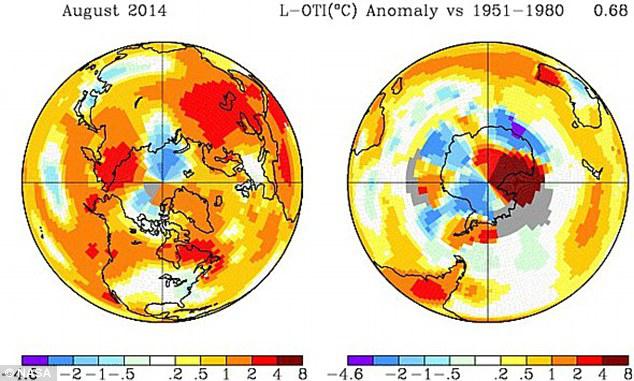
Last month was the warmest August globally since records began 130 years ago. Data by NASA shows that August 2014 experienced global highs 0.70°C above the 1951-1980 temperature average.
However, the difference is small compared with previous warm Augusts, including that of 2011, 2008, 2006 and 2003. The second warmest August was 0.69°C. in 2011 followed by 0.68°C in 1998 and 0.66°C in 2006. While this year has been exceptionally warm, NASA has warned against reading too much into a single month’s records.
Scientists had predicted extreme weather events to surface earlier this year after it looked like an El Niño event would develop in the Pacific Ocean. El Niño refers to a set of conditions when the surface of the sea in an area along the Equator in the central and eastern Pacific Ocean becomes hotter than usual.
The average water temperature in that area is typically between 1 and 3°C (around 2 and 5°F) warmer than normal during this event. This has the effect of adding huge amounts of heat and moisture into the atmosphere, ultimately affecting patterns of air pressure and rainfall across the Pacific and globally.
Greg Laden wrote in Science Blogs: ‘We don’t know how 2014 will rank as a year. If there is no El Niño it will rank high. If an El Niño gets going soon enough to affect the year’s average, 2014 may well be in the top few warmest years since global warming began.’
But warmer weather in some parts of the world could trigger a freeze elsewhere. In a separate study, researchers discovered a link between rising ocean temperatures, and a large pocket of cold air known as the polar vortex. They found that as oceans heat up and melt the Arctic ice, warm air is released that destabilizes polar air and sends cold blasts into the atmosphere. The polar vortex was responsible for the extreme and freezing temperatures experienced in the US last winter.
本时文内容由奇速英语国际教育研究院原创编写,禁止复制和任何商业用途,版权所有,侵权必究!
1.What is the correct order of years in which summer had a high temperature?
A 2014, 1998, 2006, 2011.
B 2006, 2011, 2014, 1998.
C 2014, 2011, 1998, 2006.
D 2006, 2011, 1998, 2014.
解析:选C。C 细节理解题。根据文章第一、二自然段可知,2014年八月的气温比1951—1980年八月的平均气温高出0.70℃,2011年高出0.69℃,1998年高出0.68℃,2006年高出0.66℃,因此选C。
2.What is the effect of an El Nino event?
A Sea water along the Equator becomes hotter than usual.
B Extreme weather events will be developed in the Pacific Ocean.
C There will be hotter summer and heavy rains across the Pacific.
D Huge amounts of heat and moisture are added to the atmosphere.
解析:选D。D 细节理解题。根据文章第四段This has the effect of adding huge amounts of heat and moisture into the atmosphere可知,厄尔尼诺现象增高了大气层的温度和湿度。
3.What can be implied in the passage?
A There will be no El Nino in the year of 2014.
B 2014 is the warmest year since global warming.
C Sea water along the Equator is warmer than that off the Equator.
D El Nino affects the climate across the world.
解析:选D。D 推理判断题。根据文章第四段…ultimately affecting patterns of air pressure and rainfall across the Pacific and globally可以判断,厄尔尼诺现象导致了全球气候的变化。
4.Why did severe winter attack the US last year?
A The polar vortex caused freezing temperatures across the US.
B The oceans heated up and the Arctic ice melted.
C The polar vortex caused the ocean temperatures to rise.
D The El Nino event led to the extreme weather in the US.
解析:选A。A 细节理解题。根据文章最后一段…warm air is released that destabilizes polar air and sends cold blasts into the atmosphere可知,极地气旋使去年美国的冬季寒冷异常。
5.What can be the best title of the passage?
A Extreme Weather across the World.
B 2014 Has the Warmest August Since Records.
C El Nino and Its Effect.
D Polar Cortex Caused Americans to Suffer from Severe Cold.
解析:选B。B 主旨大意题。通读全文可知,本文主要分析了导致2014年八月份成为最热8月的各方面因素。故选B。